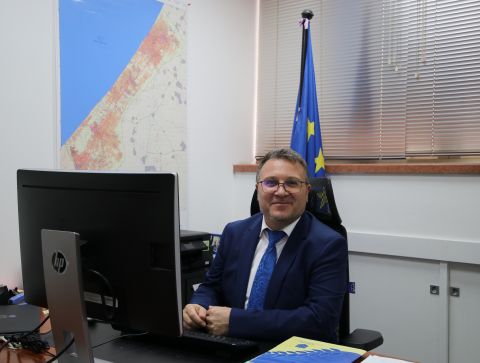
Florin Bulgariu, recently appointed Head of Mission at EUBAM Rafah, was present when the Mission was first deployed at the Rafah Crossing Point in Gaza in November 2005. Working as a border expert, he was part of the first group of Europeans posted to help with the process of building border capacity between Gaza and Egypt to facilitate free movement of people and goods across the border.
“I was there for the opening day,” he says. “It was one of the most pleasant days I’ve experienced. Many people were there. They were all enthusiastic. There was this sensation of freedom amongst people from Gaza – they were finally free to travel, free to cross the border. I have treasured pictures from that moment”.
In 2007, Hamas took over the Gaza Strip and direct assistance at the Rafah Crossing Point was suspended. Since then, EUBAM Rafah has continued working with the Palestinian General Administration for Borders and Crossings (GABC), which is headquartered in Jericho in the West Bank, to build capacity. The advice and training delivered and facilitated by EUBAM Rafah will someday be critical in Gaza if the reconciliation process between the differing Palestinian factions is successful, and the support provided by EUBAM Rafah also helps improve the functioning of West Bank crossing points, such as the Al Karamah Terminal in Jericho.
Between 2007 and 2017, Mr Bulgariu completed a number of international assignments, and returned to EUBAM Rafah in 2017 to take up the position of Head of Operations, before starting a new role as Head of Mission on 1 November 2020. What are his plans for the new position?
“I would start with human rights. This is the foundation of our work. And fighting against corruption. You want to create a healthy environment where border operations can be carried out. So, far, while international human rights organisations have expressed serious concerns about the work of certain law enforcement agencies, there have been no allegations against the GABC. This is a good foundation”.
“Based on this foundation, we can work together on enhancing the procedures and practices,” Mr Bulgariu continues. “These include procedures for more seamless border control or better access for disabled people”.
A core task of EUBAM Rafah is to promote better coordination between the seven different agencies of the GABC, in line with the Integrated Border Management (IBM) principles applied in EU countries. “We have a very good cooperation with the GABC,” Mr Bulgariu says. He stresses however that for IBM principles to be fully effective, clearer delineation of responsibilities between the seven agencies under the GABC umbrella is necessary. “The Presidential Decree of 2006, which outlines the work of the GABC agencies needs improvement to clarify which agency does what,” the EUBAM Rafah Head of Mission says.
As well as cooperation between Palestinian agencies, international cooperation is also important. “We are a small Mission, but we have a large spectrum of challenges we face,” Mr Bulgariu notes. “The solution we have found is to team up with experts from different institutions and EU instruments in order to provide maximum benefit to Palestinians. For example, we helped the GABC set up a Twinning project with the Lithuanian Ministry of Finance and Lithuanian State Border Guard Service. This project is going well. We have set up cooperation mechanisms with the EU’s anti-fraud office, OLAF, and the EU’s judicial cooperation agency, Eurojust. We were also planning a training programme on protecting cultural heritage in cooperation with Italy’s Carabinieri. Unfortunately, this was suspended due to the Covid-19 pandemic”.
Looking back at his career to date, Mr Bulgariu believes that his work in the Romanian border police allows him to relate to the work of his Palestinian counterparts. “I joined the Romanian border police in 1991, less than two years after the communist party was thrown out. Romania practically built a border management framework from nothing. If I have to make a comparison with the Palestinian situation, they are a bit above where Romania was in 1991. I grew up with changes, I know the track – what worked and what didn’t work”.
Someday, the EUBAM Rafah Head of Mission hopes to return to work in the Gaza Strip. “We believe, we hope that it will be possible to return to the Rafah Crossing Point. The EU perceives the Palestinians as one people. I hope that the different Palestinian factions will be able to come to an agreement in the interest of their people. Gazans deserve their freedom. We want to go back to Rafah, but in the current conditions, it’s pretty much impossible”.